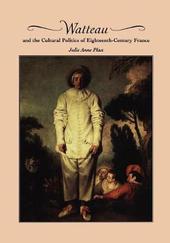
|
Watteau and the Cultural Politics of Eighteenth-Century France
Paperback / softback
Main Details
| Title |
Watteau and the Cultural Politics of Eighteenth-Century France
|
| Authors and Contributors |
By (author) Julie Anne Plax
|
| Physical Properties |
| Format:Paperback / softback | | Pages:274 | | Dimensions(mm): Height 254,Width 178 |
|
| Category/Genre | Art and design styles - c 1600 to c 1800
Painting and paintings
Individual artists and art monographs |
|---|
| ISBN/Barcode |
9780521200844
|
| Classifications | Dewey:759.4 |
|---|
| Audience | | Postgraduate, Research & Scholarly | |
|---|
| Illustrations |
Worked examples or Exercises
|
|
Publishing Details |
| Publisher |
Cambridge University Press
|
| Imprint |
Cambridge University Press
|
| Publication Date |
28 April 2011 |
| Publication Country |
United Kingdom
|
Description
In Watteau and the Cultural Politics of Eighteenth-Century France, Julie Anne Plax engages in an interdisciplinary examination of several categories of Watteau's paintings - theatrical, military, fetes, and signboards. Arguing that Watteau consistently applied coherent strategies of representation aimed at subverting high art, she shows how his paintings toyed ironically with conventions and genres and confounded traditional categories. Plax connects these strategies to broader cultural themes and political issues that Watteau's art addressed throughout his career, thereby revealing the substantial unity of his oeuvre. Using a wide array of visual and verbal primary resources to illuminate the richness of the visual culture of eighteenth-century Paris and the last years of Louis XIV's reign, Watteau and the Cultural Politics of Eighteenth-Century France is a year 2000 text which will continue to contribute substantially to the current reassessment of the period.
Reviews"Carefully and clearly argued, Plax's book sets a model for actively integrating visual, historical and theoretical concerns." CAA Reviews "Plax does well to call our attention in a new way to this capacity for transformation of self and culture represented by Watteau's figures." Eighteenth-Century Studies
|